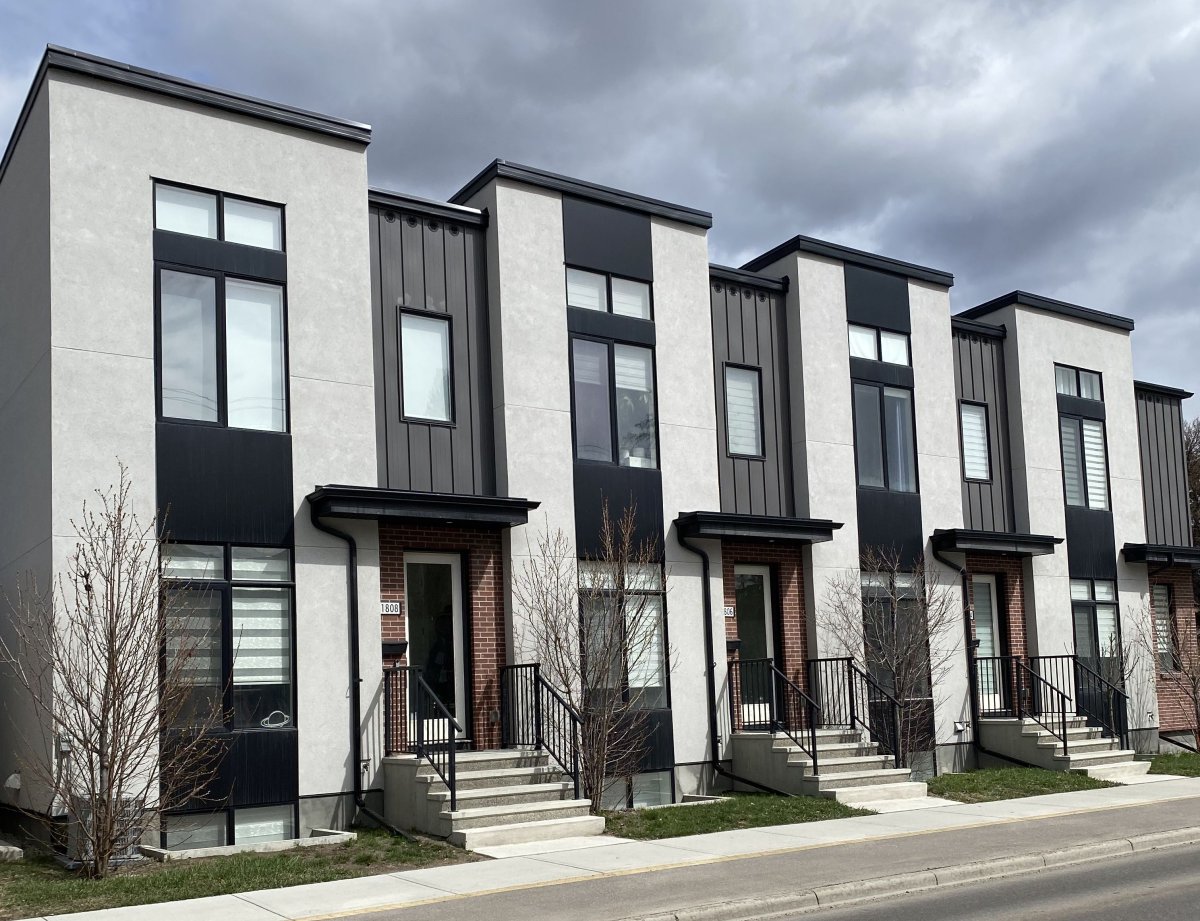The northwest Calgary community of Capitol Hill is part of a self-guided walking tour the city has posted on its website.

On stops along the R-CG walking tour, you can see where lots that used to host a bungalow have been replaced by semi-detached homes or row houses. But some Calgarians are concerned about what will happen to the value of existing homes when the higher density homes are built.
R-CG is a land-use district that allows for rowhouse-style housing. According to the city, 95 per cent of R-CG applications between 2014 and 2023 were approved.
On Monday, council will consider a proposal to re-designate virtually all residential areas to allow for duplexes, townhouses and rowhouses.
Rezoning to R-CG would automatically open up single-detached home parcels (RC-1) to greater density.
“It’s a tricky issue because there’s people who already own houses who naturally are thinking they would like to preserve the value of the house and the people who are trying to enter the housing market who want to have lower prices. There’s different groups that have different points of view,” said Alex Whalley, associate professor of economics at the Haskayne School of Business at the University of Calgary.
Whalley, who teaches courses in economics and real estate, doesn’t think there would be much of a decline with smaller-density projects like duplexes and fourplexes.
“Proportional increase in density, where it’s relatively small scale and where congestion is not really changing a lot and there’s not a ton of traffic coming from that, it’s not clear that would reduce property values,” Whalley said.
He points out that one of the upsides is greater local amenities. More people means more local shops, restaurants and schools, which can make a neighbourhood more valuable and desirable.

Get daily National news
“If you are in a very dense area, those kind of coffee shops can be supported; they have hundreds of customers, instead of five customers,” Whalley said.
Whalley said it’s natural for people to have concerns about neighbourhood change, but said change is part of living in a growing city and there’s a whole group of people who are priced out of the market.
“The world is changing. We have a serious affordability issue not just in Calgary but across the country and even around the world so some changes need to happen,” Whalley said.

Historically, property owners have played a large role in making decisions about what happens with local governments.
“City council is at least partly being influenced by local taxpayers who say, ‘the biggest asset I have, if it’s not my pension, it’s the equity in my home and if you approve all this high density development, you’re going to push down housing prices,'” said Concordia University economist Moshe Lander.
He said elected officials are left with trying to appeal to voters and homeowners vote disproportionately more than non-homeowners.
“You don’t want to tell them the reason why housing is so expensive is because you (voters) won’t allow me to approve more housing,” Lander said.
People wanting to build higher-density homes would still need to apply for a development permit and be subject to a variety of rules, but they wouldn’t need to go before city council for a land-use change.
“There’s a lot of concerns about ‘not in my backyard,’ but you also have to take into account people who are thinking about the neighbourhood they want to be in. Hopefully we can come up with a solution that improves the situation for everybody but it will be a challenging debate,” Whalley said.
Whalley said the debate cuts across generational lines.
“Older generations are more likely to own a home so from their side they’re thinking, ‘I don’t want my neighbourhood to change that much. I’m concerned about what would happen to my house value.’ Whereas someone who is much younger and they’re working hard at their job, but they look at their paycheque and they look at the house cost and think, ‘How am I ever going to afford to own a house?'” Whalley said.
Concerning this week’s hearings at city hall, Whalley advises people to try to be understanding of the different points of views.
“It’s a tough issue. There’s going to be different perspectives on it. It’s not easy. Absolutely people are very concerned about their neighbourhoods and very concerned about where they live,” Whalley said.
Basic economics tells us that one way to reduce to the price of housing is to increase supply so blanket rezoning can be one of the tools to lower prices, but Whalley points out there have been other factors that have been reducing supply as well like supply chain problems, cost of material and labour shortages.
Calgary is set for a record public hearing beginning April 22, with over 650 people signed up to speak.







Comments